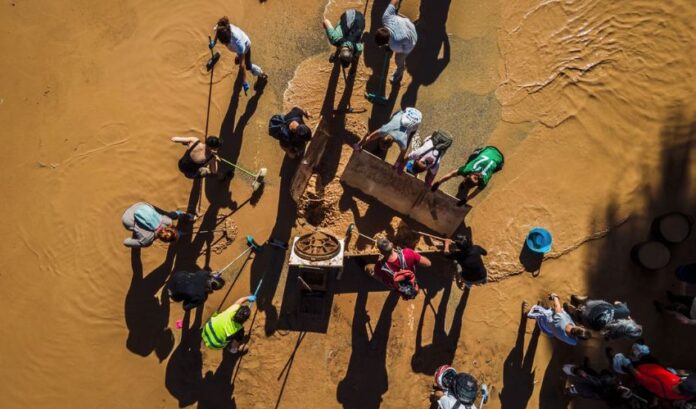The catastrophic floods in Spain this week have laid bare two harsh realities: the climate crisis is intensifying, and the fossil fuel industry’s impact is becoming increasingly deadly. There needs to be urgent measures at the global level as world leaders prepare for the COP29 climate conference in Baku.
Scenes from Spain’s Valencia region – cars submerged in muddy torrents and streets swept away – stressed recent climate disasters across Europe, the US, and Asia, revealing a disturbing pattern. Pakistan has been one of the worst-hit countries in the world due to the climate change effects including the deadly 2022 floods — in which one-third of Pakistan drowned— and deadly monsoon sessions followed by longer and hotter summers and shorter winters.
The unprecedented floods in Asia, and Europe and cyclones in the United States are reflections of rising global temperatures.
The United Nations Secretary-General António Guterres declared “code red” and there are urgent needs that must lead to decisive policies at COP29. The secretary-general calls on the COP29 conference to set a clear end date for fossil fuel use, urging world leaders to finally prioritize renewable energy over fossil fuels.
As per the Guardian, scientists at World Weather Attribution link intensified floods, fires, and storms directly to human-driven climate change, with recent studies revealing that emissions increase the severity of these disasters.
For the world to respond meaningfully to Spain’s tragedy and the unfolding climate crisis, COP29 must confront the fossil fuel industry and commit to urgent emissions reductions.
Pakistan’s case
Pakistan has a lot of expectations from the COP29 as the country is committed to mitigating the worst effects of the climate crisis and needs global support including waiving of debt and loans by the developed countries to help the poor in society.
Pakistan as a developing country faces significant vulnerabilities in the context of the global climate crisis despite contributing minimally to carbon emissions on a global scale.
With a mere 1% share of global greenhouse gas emissions, Pakistan is one of the countries most affected by climate change suffering from increasingly frequent and severe weather events including floods, droughts, and heatwaves.
These phenomena not only pose threats to the country’s agriculture and food security but also exacerbate socio-economic challenges, impacting vulnerable populations the hardest.
In light of the crisis, Pakistan has been calling for debt relief from international creditors to alleviate the financial burden on its economy. Such relief is critical not only for managing immediate health and economic recovery efforts but also for investing in sustainable development initiatives.
By waiving debts, the country could redirect funds toward climate mitigation strategies that address local environmental issues, such as improving infrastructure to withstand climate shocks and promoting renewable energy sources.
Pakistan has emphasized the need for global cooperation to tackle the climate crisis, advocating for enhanced support from developed nations.
Islamabad policymakers, lawmakers and think tanks seek to implement adaptive measures to combat climate-related challenges while pursuing development goals. By focusing on climate resilience and sustainability, Pakistan aims to ensure that its future growth is not hindered by the adverse effects of climate change, despite its limited historical contribution to global emissions.






